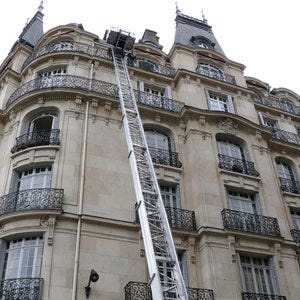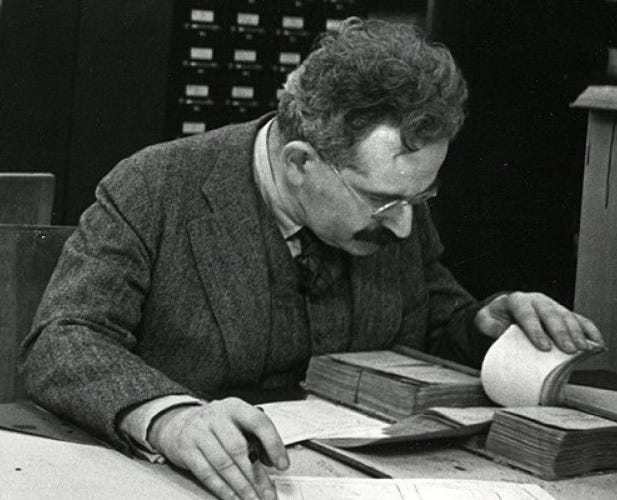Maybe it’s these vile times, maybe it’s my age, next up 77 on a day when Hitler (how he would have reveled in the proliferation of his Mini-Me’s) would have been 136, my deteriorating body (nothing special - we get old and bits drop off, so be it), maybe it’s the impossibility of focusing on yet another synonym for masturbation or drunken-ness. Or the long-understood truth that the abyss between my researches and the young who coin and use the ever-evolving counter-language is unbridgeable. Maybe it’s just that inescapable Jack Pudding/Lord of Misrule, Lez Circs brandishing his banner declaring, and who could argue, ‘Shit Happens.’ Whatever the cause I seem to be on a confessional or at least self-referential tip. It is nine months since we quit London, and simultaneously Paris and moved south to Marseille. I started writing this in a debris of book-filled boxes. Shit duly happened and I hit pause. It’s time I finished it.
I won’t say bereavement would have been preferable, but it has its forms and formats (perhaps religion’s sole value though I want none at my obsequies) and however wretched the experience, we are attuned and if we keep placing our feet in the foredained places, we shall emerge on the other side. We know the words, the pieties, the paths to be followed. But there are other life-changers that are less helpful. Let’s simply suggest that moving house, death’s runner-up in chaos’s calculus, can punch above its weight.
Though for the burdens it carries (pun potential acknowleged), ‘moving’ is too neutral a term. We’re always moving, from A-B, from person to person as well as place to place. Or moving transitively: things, even emotions, though the latter tend to move us. Not simply because it is what we have done, I would go for the French where the term is déménager which, in uses that date from 1262 suggest not just movement but destruction or taking apart. Voluntary in many cases, but the sense of dismantling, de- working as ‘un-’, ménage being one’s home and household, is central. The movers, déménageurs, arrive, tear down, entomb in boxes and blankets and spirit away to their waiting van. In France, on higher floors with over-narrow stairs or coffin lift, the disappearance is accentuated by a purpose-hired monte-meuble, a furniture lift. Up it comes. Windows wide, your packaged life life vanishes into space and flies down to the street. You stand, all possibilities of seating gone, and think of what has happened in these empty rooms. All gone. Now you too. Next stop: reménager, defined as ‘relocate’ though the great French dictionary Tresor de la langue francaise (1994): (http://atilf.atilf.fr) has no such headword and while it appears on line, I have yet to meet it in the wild.1
My choice of the French is underpinned by ther Tresor’s sense 3: Sa tête, sa raison déménage, lit. one’s head, one’s reason leaves, anglice ‘you lose your mind.’ It appears during the French revolution (did Madame Defarge and the other tricoteuses, knitting liberty bonnets as they sat around the ‘national razor’, make punning jokes?) and seems to suit moving’s madness.
I am, quite consciously insofar as I know my history, echoing others of my people who around 90 years ago, made a similar journey and fled disintegrating eastern Europe for republican France. Was I was persuaded by the belief that here those same people, at a time of revolution, were given a level of civil rights that they could find in few other countries of the time. Or was it my desire, far more likely in one of my inescapable superficiality, to precede death with even the tiniest taste of a representative number of the famous 300-plus cheeses (mai bien sûr, lait cru, m’sieur). Or a precocious lust for Brigitte Bardot when my prep school peers set a border for their enthusaism for female embonpoint at Diana Dors (real surname the snigger-worthy Fluck) or gazed westward, as they did for so much else, to Jayne Mansfield?
No more than I have done when visiting the rural fastnesses of the UK, I lack any interest in the grim Little Englands of the Dordogne, tucked up in villages that no longer boast butcher, baker nor, however figuratively candlestick makers (shall we substitute the quincaillerie, the hardware store), but offer half a dozen estate agents (no, not immobiliers) whose names glory in bad puns on the word ‘frog’.2 I am unable, anyway, to drive to the supermarché where, on étagères anglaises (and even more expensive than Brexit's inflated prices back in Blighty) one can buy Marmite but not marmites. A creature of the city I need concrete ’neath my feet rather than grass and the anonymity that comes as default with the great conurbations. I need...let us call it urbanity, though only the OED’s sense 3: ‘urban life’, and not that of such great exemplars of sense 1: ‘courtesy, civility; refinement, sophistication,’ as Cary Grant.
This, other than to hospice or hospital, is the final move. I have chosen the great Africa-facing Mediterranean port of Marseille. Marmite again, in the context of love it or hate it. Marseille, the oldest French city, has a bad rep. The noir novels of the late and indeed great Jean-Claude Izzo offer the most translucent of veneers and we can follow the meaderings of his characters on a decent map. John Frankenheimer’s 1975 movie French Connection 2 gave us Popeye Doyle's glorious run around the beachfront in fruitless pursuit of Frog One, master of the eponymous heroin trade. This too had a real-life backstory: the ‘connection’ was established in the 1930s and featured top gangsters Paul Carbone and François Spirito. They also provide the ‘real lives’ that underpin 1970’s Delon-Belmondo hit Borsalino.
But for my context it is Walter Benjamin. The philosopher and cultural critic, translator of Balzac, Baudelaire and Proust, the historian of the Paris passages, who could write a deathless essay devoted to unpacking his library. I do not compare myself, but he too was a words man and lover of books. And like me, a rootless comopolitan. Like me too he had a bad heart and a ditto back and used strong analgesics to get him through the day. In 1940 he decided to flee over the Pyrenees to Spain. Fascist too, but ostensibly neutral. He was told that the authorities there would send him back to occupied France, which meant Nazi capture and quite likely execution. Unable to escape in person, he did so in the one way he felt remained: the pain-killers duly killed his pain. It appeared, too late of course, that the repatriation order was a rumour, or certainly cancelled before Benjamin took his final dose. He was just 48.
To me he is the supreme example of what, growing up, I saw as the Jew-to-be. I did not know of him then, but was conscious of what Jew meant to me: an intellectual, an outsider, a rebel, a dweller in the pre-World War II diaspora.3 Truly the citizen of nowhere that I see myself. Who more than him. And if not Benjamin, I had no claims on such towering intellect, then, since I was hardly immune to America’s offerings, Lenny Bruce, my only hero and another premature corpse at 40.
But…Israel, still basking in its brief years as sanctioned western good guys? I got the point, but for me, I thought not. Why would I suddenly turn folk-singing, nationalist clodhopper, even with a gun, at the far end of the Med. Let the desert alone, I had no interest in whether it bloomed or not. I went, at parental diktat, post-war in 1967. My university pals, coupled up, were off in Greece tripping (all senses) around the monuments. As for me, I suffered from Portnoy’s real Complaint, an inability to get turned on among the Sabras. Meanwhile, fuck this: not even Tel Aviv offered a sign of newly released Sergeant Pepper. Superficial, I have no defence. It all reminded me of the tedium of annual visits to the synagogue for the High Holy days.4
I am assimilated, and my life has been largely sheltered within that illusion. Jew hatred, exhausted by the long party of the Holocaust, was on extended leave. At least in the west. Now it is back, and if bigotry has are other targets to be dealt with first, how long will that feeble barrier hold? Then and now I would never have the ability to become even a micro-Benjamin, but one dreams and his was the way, tragic, ironic ending included.5
Women and children this way. Alte kakas too. The left hand side of the ramp for me.
_______
There is, however, reaménager, which deepl, the online translator, defines as ‘redesign, revamp, redevelop.’ Jules Verne used it in 1874 in the context of a ‘corral’ of sheep and goats. But that needs no personal dislodging, merely money and desire. Its root, aménager, appears in the late 12th century and sense one is ‘making somewhere habitable’. Further back yet, in middle French is mesnagier, to live, inhabit.
For slang’s appropriation of the word, see https://greensdictofslang.com/entry/abmvimi.
a book review, stumbling on my name, termed me the ‘maverick lexicographer’. I always assumed crazy cowboy stuff, but see OED sense 2: ‘An unorthodox or independent-minded person; a person who refuses to conform to the views of a particular group or party; an individualist.’ Sounds good to me.
On the other hand I found, at from a distance still find the prayer book’s pages of Hebrew text aesthetically pleasing. I like, as in much else, the rectilinearity, the squareness. I get the same pleasure from a spread of 6-point citations in the old, print OED. It’s a word person’s thing I suppose.
I say again: I am no Benjamin. If you want more than the obvious proof, please read this: https://www.nationalww2museum.org/war/articles/walter-benjamin.





The thanks are mine. I hope you and yours, incl. Sallie, are as well as can be.
We try for the irst and most likely stumble at the latter.